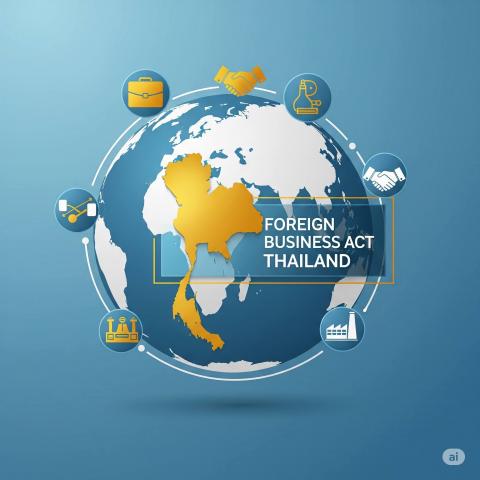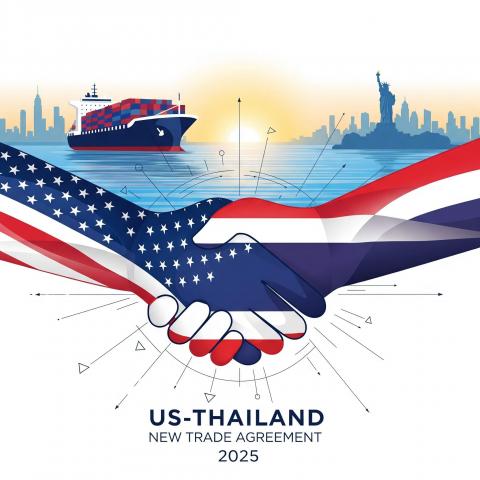For any foreigner looking to start a business in Thailand, understanding the nation's legal landscape is the first step to success. The cornerstone of this landscape is the Foreign Business Act, B.E. 2542 (1999), a law that defines which business activities are restricted for non-Thai nationals.
Navigating this Act can be complex. Two key terms that often cause confusion are the Foreign Business License (FBL) and the Foreign Business Certificate (FBC). While both documents allow a majority foreign-owned company to operate in restricted sectors, they are obtained through very different channels and apply to different situations.
This guide will clarify the crucial differences between the FBL and FBC, helping you determine the right path for your enterprise in Thailand.
What is a Foreign Business License (FBL)?
The Foreign Business License is a permit issued directly by the Ministry of Commerce. It is the standard route for a foreign-owned company to seek permission to engage in business activities listed as restricted under the Foreign Business Act.
Purpose and Who Needs It
An FBL is required when a "foreigner" (which includes a company with 50% or more foreign shareholding) wants to operate a business that falls under List 2 or List 3 of the Foreign Business Act. These lists cover a wide range of activities, from certain types of construction and advertising to many service-based industries.
- List 1: Businesses strictly prohibited to foreigners (e.g., media, rice farming).
- List 2: Businesses related to national security, arts, culture, or natural resources. Requires permission from the Cabinet.
- List 3: Businesses in which Thai nationals are not yet deemed ready to compete with foreigners. This is the most common list for which an FBL is sought.
Key Requirements and Application Process
The FBL application process is notoriously complex, discretionary, and time-consuming.
- Minimum Capital: A minimum capital of at least THB 2 million is required. For businesses under List 2 or 3, this often increases to THB 3 million.
- Application Submission: The application is submitted to the Foreign Licensing Division at the Department of Business Development, Ministry of Commerce.
- Justification: The applicant must prove that their business will provide significant benefits to Thailand, such as transferring valuable technology, creating local employment, or contributing to social and economic development.
- Timeline: The process can take anywhere from 4 months to over a year, with no guarantee of approval. The Foreign Business Committee reviews the application and its decision is final.
What is a Foreign Business Certificate (FBC)?
The Foreign Business Certificate serves a similar purpose to the FBL—it allows a foreign-owned company to engage in restricted businesses. However, the FBC is not granted directly but is issued as a result of a promotion or special treaty right.
Think of it as a bypass to the standard FBL application process.
How is it Different from a License?
The key difference is the basis for approval. You do not apply for an FBC in the same way you apply for an FBL. Instead, you receive the FBC after being granted a promotion or protection under a specific law or treaty.
The two most common ways to become eligible for an FBC are:
- Thailand Board of Investment (BOI) Promotion: If your business activity is eligible for promotion by the BOI, and you successfully receive an Investment Promotion Certificate, the BOI will notify the Ministry of Commerce to issue an FBC for your company. The BOI promotes industries that are strategic priorities for Thailand.
- The U.S.-Thai Treaty of Amity: Under this treaty, American citizens and U.S.-majority-owned companies are given "national treatment," meaning they can operate most businesses on the same level as Thai companies. After obtaining certification from the U.S. Commercial Service in Bangkok, they can present this to the Ministry of Commerce to receive an FBC.
Key Differences: FBL vs. FBC at a Glance
_
| Feature | Foreign Business License (FBL) | Foreign Business Certificate (FBC) |
|---|---|---|
| Basis of Approval | Discretionary approval from the Ministry of Commerce | Automatic right from a promotion (e.g., BOI) or treaty (e.g., Treaty of Amity) |
| Application Process | Complex, lengthy, and uncertain. Requires strong justification of benefits to Thailand. | A procedural step after obtaining BOI promotion or Treaty of Amity certification. |
| Who Should Consider It | Foreign businesses in restricted sectors that are NOT eligible for BOI or other promotions. | American-owned companies or businesses in BOI-promoted industries. |
| Timeline | 4-12+ months | Relatively quick (weeks) once the underlying promotion/treaty is secured. |
| Certainty | Low. Approval is not guaranteed. | High. Issuance is a formality after meeting promotion/treaty requirements. |
Which Do You Need for Your Business in Thailand?
Choosing the right path depends entirely on your business activity and nationality.
- First, check if your business is eligible for BOI promotion. The BOI offers significant tax and non-tax incentives beyond just 100% foreign ownership. This is often the most advantageous route if available.
- If you are an American citizen or represent a U.S. company, the Treaty of Amity is a powerful tool that provides a direct path to obtaining an FBC for most business types.
- If your business is in a restricted category, NOT eligible for BOI, and you are NOT American, then the Foreign Business License (FBL) is your only option for majority foreign ownership.
Navigating the Foreign Business Act is a critical legal hurdle. The complexities of the FBL application and the specific requirements of the BOI and Treaty of Amity mean that professional legal guidance is not just recommended—it's essential for a smooth and successful market entry.
Frequently Asked Questions (FAQ)
Q: Can I get 100% foreign ownership with an FBL?
A: Yes, if your FBL application is approved, it can grant you 100% foreign ownership for the specific business activities listed on the license.
Q: How long does it take to get a Foreign Business License in Thailand?
A: The official timeline can vary greatly, but applicants should plan for a minimum of 4-6 months. Due to the complexity and review process, it can often take longer.
Q: Is a BOI promotion better than getting an FBL?
A: For businesses that qualify, a BOI promotion is almost always superior. The process is more transparent, comes with valuable tax and non-tax incentives, and provides a clear path to receiving a Foreign Business Certificate, avoiding the uncertainty of the FBL application.
Contact Our Bangkok Business Lawyers
The right legal structure is the foundation of your success in Thailand. Whether you need to explore BOI eligibility, apply for a Foreign Business License, or leverage the Treaty of Amity, our experienced corporate lawyers can provide the clarity and support you need.
Contact PS Law & Business today for a consultation on your business setup in Thailand.




